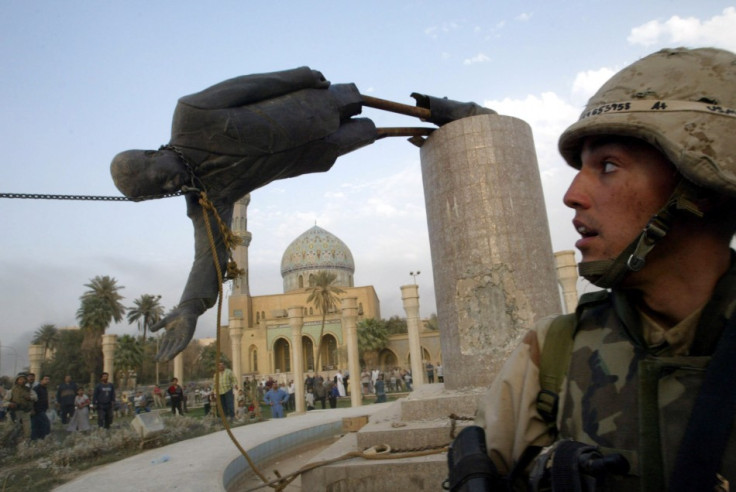Could Syria Become the New Iraq?

In October 2011, seven months into the Syrian government's brutal crackdown on pro-democracy protesters, President Bashar al-Assad warned western powers that they risked provoking an "earthquake" that would "burn" the entire Middle East region if they attempted an intervention in Syria.
His words were widely dismissed by critics as scare-mongering, and activist groups accused the authoritarian leader of manipulating minority fears of a sectarian bloodbath in order to keep himself and his cronies in power. The violent way in which the regime has responded to popular calls for change has certainly done little to aid Assad's credibility, but that alone does not mean his warning itself has no truth to it.
Although much has been made of the successes of the Arab Spring uprisings in toppling dictators across the Maghreb - the insinuation being that Syria must logically be the next regime to fall in the Arab world - predictions of Assad's imminent demise are not only "hopelessly optimistic", according to the Independent's Robert Fisk, but fail to take into account the complex and murky history of the country's politics.
A History of Sectarianism
Assad's dynastic and minority rule is much more entrenched and has a broader support network in Syria than Ben Ali, Mubarak or Gaddafi had in their countries, and Syria also has a history of demographic and sectarian tension that makes it more comparable to Iraq than to any of the countries of the Maghreb.
Although the majority population in Syria is Sunni Arab, there are also significant and influential minority groups that help shape the politics of the country, including the ruling Alawite sect, Christians, Druze, Kurds and Jews. As well as being socially divided along religious and ethnic lines, Syria is also divided linguistically, with widely divergent dialects spoken in various parts of the country that many linguists regard as separate languages (not to mention several non-Arabic languages, including Armenian, Kurdish and Turcoman).
As in Iraq, the fragmented nature of the country facilitated the rise to power of the Ba'ath party in the 1960s, who promoted their pan-Arab secular ideology as a way of bridging cultural and religious divides in the countries.
It is because of the entrenched sectarian divisions in Syrian society that the Assad dynasty (part of the Ba'ath party) is seen (and promotes itself) as a stabilising factor in the country.The predominantly Sunni nature of the current uprising has stoked fears in minority communities that their interests will not be protected if the current regime falls.
The Alawites in particular, who currently hold prominent positions in the nation's security forces, secret police, military and political elite, will be highly nervous about a potential Sunni backlash against years of oppressive rule by an Alawite minority. Just as the fall of Saddam Hussein's minority Sunni rule in Iraq prompted a brutal response from the repressed Shia majority, so too could the disintegration of Assad's government prove potentially disastrous for Syrian Alawites. Christians and Druze, too, will be wary of possible sectarian clashes in the power vacuum that may follow Assad's descent from power.
Fears of an Iraqi-style sectarian bloodbath, arguably stoked by the current regime, have prompted mass pro-government protests in many towns and cities across Syria. Assad, although derided for his oppressive policies and ruthless crackdown on protesters, is nevertheless seen by many in Syria as the only agent capable of maintaining peace in the country.
The West's Vested Interests
On the wider stage a sectarian-inspired civil war in Syria would also be a potential boon to the U.S. and its long-time ally Israel. Syria has long been a bone of contention for the U.S. administration for its staunch anti-western policies and its close ties to Israel's mortal enemy and perceived potential nuclear threat, Iran. Indeed, both Syria and Iran featured highly on George W. Bush's notorious "axis of evil". With mounting international pressure on Iran in regard to its nuclear enrichment programme, a distracted and de-clawed Syria would give Israel and the U.S. a window of opportunity to target Iranian nuclear sites without fearing a Syrian-led backlash.
The toppling of Assad would also provide western powers with the opportunity to insert a pro-western government in his place - a strategic move that would render the Levant region comparatively harmless in the eyes of American and the west. The prevalent opposition movement in Syria, led by the Syrian National Council (a coalition of Sunnis, activists and Kurds) and the National Coordination Committee (an internal bloc of opposition politicians) have been criticised for being friendly with America and there are fears that the west will support the Syrian revolution in order to replace Assad with a stooge. In this sense, Syria can again be compared to Iraq, where the American-instigated democratic process brought Prime Minister Nouri al-Maliki into power - widely regarded at the time as a puppet for the American administration and an ally in the U.S. fight against Iran. Since helping brin Maliki into power, the U.S. has changed its mind about its erstwhile ally, and is now rumoured to be trying to force him out.
The Arab League's recent move to suspend Syria's membership has also raised questions about the motives of the international community in helping to push out Assad. The wide and vocal condemnation of Assad's violent reprisals on protesters was not echoed in the cases of Bahrain or Yemen when the (U.S.-friendly) governments there decided to slaughter their people in response to similar popular protests. It is also highly ironic, if not suspicious, that a body made up of 22 Arab states known for oppressing their people has made such a decisive move in condemning Assad's behaviour. The fact that Syrian citizens have responded to the decision by attacking the embassies of Arab League nations in Damascus suggests that public opinion in the country remains divided when it comes to supporting or opposing Assad's regime.
Another Iraq?
In terms of its potential to slide into sectarian conflict (and the possible imposition of a western-friendly government in the country), then, Syria does possess certain characteristics that lend it to becoming a "new Iraq." However, the opposition movements comprises a cross-section of Syrian society, suggesting that the protesters are united in a common hatred of the iron-fisted regime. But this may change once Assad leaves power and the political bargaining-table is opened up to various religious and cultural demands.
Syrians have in recent years been spooked by the fates of bordering Iraq and Lebanon, and many still support the current regime as a bulwark against possible sectarian violence. In fact, the greatest threat to Assad comes not from within the country, but from the possible intervention from outside forces. But whether these factors will prove decisive enough to maintain the ruling elite's increasingly desperate grip on power, still remains to be seen.

© Copyright IBTimes 2025. All rights reserved.




















